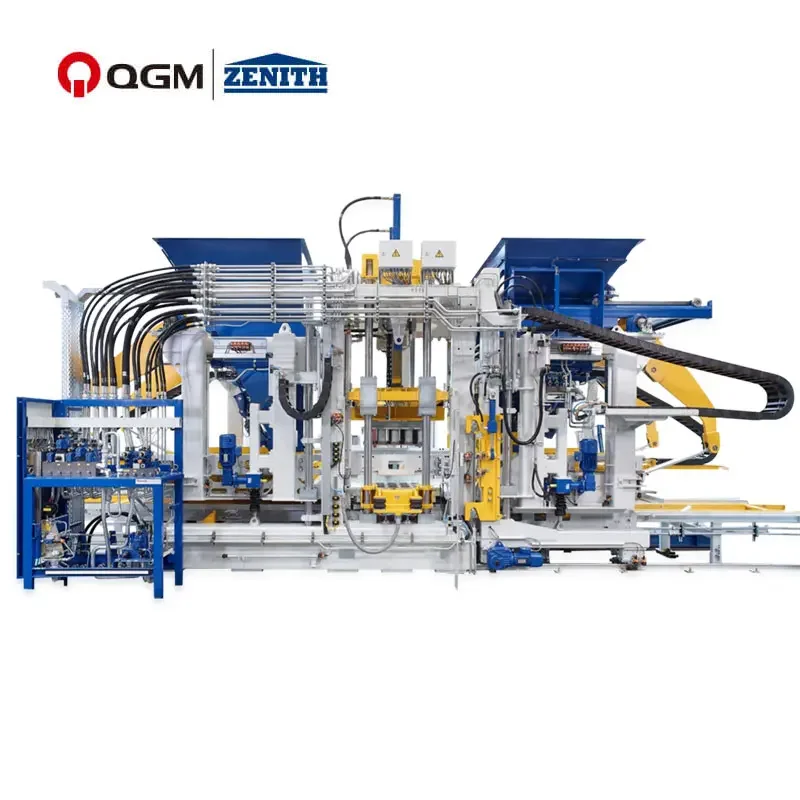What is a Brick Making Machine?
2025-09-09
A brick making machine is a mechanical device that manufactures bricks from various raw materials, primarily concrete, cement, fly ash, or soil. It automates the processes of mixing, molding, and compacting these materials into bricks of consistent size, shape, and density. These machines are fundamental to modern construction, enabling the efficient, high-volume production of building blocks for everything from residential homes to large-scale infrastructure projects. The core function of any brick machine is to transform raw material into a durable, standardized construction component with minimal human intervention.
How Brick Making Machines Work
The operation of a brick making machine can be broken down into a logical sequence. First, the raw materials are precisely measured and mixed with a small amount of water to achieve a homogenous blend. This mixture is then fed into the machine's mold chamber. Here, a powerful hydraulic system applies immense pressure to compact the material, forcing it into the desired shape. Depending on the machine type, the newly formed brick is then either ejected for curing or passed through a drying chamber. Our factory designs its brick machines for intuitive operation, ensuring this process is both efficient and reliable for our clients.
Key Technical Specifications
Understanding the product parameters is crucial for selecting the right equipment for your project needs. Here are the key specifications for our standard brick machine models:
Production Output: Our machines are rated by their output per hour or per day. Capacities can range from small-scale machines producing 800-1,000 bricks per hour to large, fully automated plants capable of producing over 20,000 bricks per hour.
Power Requirement: The power consumption is a critical factor for operational costs. Our models typically require a three-phase electrical connection with power ratings ranging from 15 kW for smaller units to 45 kW for high-capacity automated systems.
Operating Pressure: This is the hydraulic pressure used to compact the raw material, measured in pounds per square inch (PSI) or Newtons per square meter (Pascal). Higher pressure generally results in denser, stronger bricks. Our machines operate at pressures between 2,000 and 3,500 PSI.
Automation Level: Options range from manual and semi-automatic to fully automatic systems. Fully automatic brick machines integrate material feeding, mixing, molding, and stacking with minimal operator input.
| Parameter | Description | Importance |
| Production Capacity | Bricks produced per hour (BPH) | Determines project scale and ROI timeline |
| Power Consumption | Measured in Kilowatts (kW) | Impacts long-term operational costs |
| Hydraulic Pressure | Measured in PSI or MPa | Directly correlates to final brick strength and density |
| Automation Grade | Manual, Semi-Auto, Full-Auto | Affects labor requirements and production consistency |
Advantages of Using a Modern Brick Machine
Investing in a modern brick making machine from our factory offers several distinct advantages over traditional manual methods. The primary benefit is a massive increase in production efficiency, allowing for the completion of large orders in a fraction of the time. Furthermore, automation ensures consistent quality and dimensional accuracy in every single brick, a level of uniformity nearly impossible to achieve by hand. This consistency directly translates to less waste on the construction site. Finally, while the initial investment is significant, the reduction in long-term labor costs and material waste leads to a strong return on investment.
Frequently Asked Questions
Q1: What are the main types of brick making machines?
The main types are static machines, which produce bricks in a single location, and mobile machines, which can be moved to different sites. They are also categorized by operation: manual, semi-automatic, and fully automatic. Fully automatic machines, like those from Zenith, handle the entire process from feeding raw materials to stacking finished bricks with minimal human oversight.
Q2: What raw materials can be used with a brick machine?
Modern brick machines are highly versatile. The most common material is concrete, but they can also effectively use fly ash (an industrial byproduct), cement-stabilized soil, and even certain types of clay. The choice of material depends on local availability, cost, and the required specifications for the final brick product.
Why Choose Us?
Ready to revolutionize your construction supply chain? Explore the robust and efficient brick machine solutions available from Zenith. Our machines are engineered for durability, high output, and exceptional return on investment. Contact Zenith today to discuss your project requirements and find the perfect equipment to build your future.
